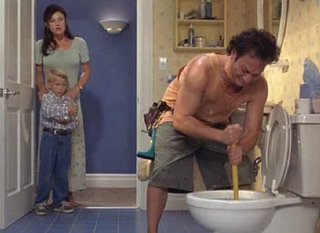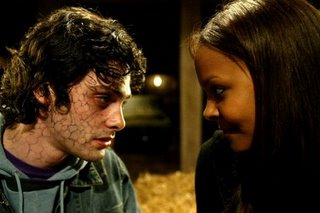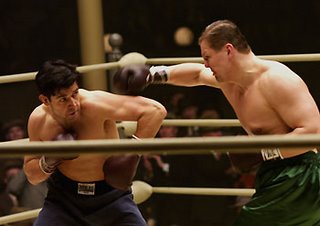 This wholly unmerited and unwelcome sequel to 1999s reviled comedy Deuce Bigalow washes up on our shores with writer and star Rob Schneider owing considerable compensation to cinemagoers unlucky enough to see it under the ‘polluter pays’ principle. I emerged from his latest laugh-free effort with an immediate need to wash my eyes, having seen his ‘he-whore’ character relocate to Europe, or the stoned Amsterdam bit of it anyway, to track down a serial killer who is decimating the gigolo herd.
This wholly unmerited and unwelcome sequel to 1999s reviled comedy Deuce Bigalow washes up on our shores with writer and star Rob Schneider owing considerable compensation to cinemagoers unlucky enough to see it under the ‘polluter pays’ principle. I emerged from his latest laugh-free effort with an immediate need to wash my eyes, having seen his ‘he-whore’ character relocate to Europe, or the stoned Amsterdam bit of it anyway, to track down a serial killer who is decimating the gigolo herd. How Bigalow Can You Go?
 This wholly unmerited and unwelcome sequel to 1999s reviled comedy Deuce Bigalow washes up on our shores with writer and star Rob Schneider owing considerable compensation to cinemagoers unlucky enough to see it under the ‘polluter pays’ principle. I emerged from his latest laugh-free effort with an immediate need to wash my eyes, having seen his ‘he-whore’ character relocate to Europe, or the stoned Amsterdam bit of it anyway, to track down a serial killer who is decimating the gigolo herd.
This wholly unmerited and unwelcome sequel to 1999s reviled comedy Deuce Bigalow washes up on our shores with writer and star Rob Schneider owing considerable compensation to cinemagoers unlucky enough to see it under the ‘polluter pays’ principle. I emerged from his latest laugh-free effort with an immediate need to wash my eyes, having seen his ‘he-whore’ character relocate to Europe, or the stoned Amsterdam bit of it anyway, to track down a serial killer who is decimating the gigolo herd. I Eat Dead People...

Bradley uses the tropes of zombie cinema to explore the real horrors of teenage existence; classroom bullies, peer pressure, social awkwardness and the stomach-clenching anxieties that whirl around the first flush of love. As penned by Derek Handy (Dead Bodies), Girl is a wholly self-aware teenage romp that takes as its inspiration the American high school comedies and screaming horrors. With his tongue firmly planted in his cheek, Nandy trots out a familiar series of off-the-shelf characters, lilting dialogue and clichéd set ups. None of it is all that inspired, the jokes are weak and predictable and the whole enterprise suffers badly from not having any real balance between its American inspiration and Irish setting. The splattering special effects work from Image Effects is a little more successful, culminating in an entertaining free-for-all with a tractor-mounted hedge strimmer and a small army of stumbling zombies.
Immoveable Object

The Guardian's excellent website has a rare interview with the venerated Japanese animator Hayao Miyazaki, the freewheeling genius behind Spirited Away, Princess Mononoke, and the imminent Howl's Moving Castle, where he offers his considerable opinions on modern animation, his creative process, the state of the planet's ecology and the unusual methods he was forced to employ in dealing with The Great Satan, or Harvey Weinstein as he is known in this dimensional incarnation. It's the reclusive Miyazaki's first interview with a journalist in over a decade. Check it here...
Punching Above Their Weight
 A sepia-toned portrait of a working-class hero, Cinderella Man takes the almost impossibly perfect elements of the saga of underdog boxer James J. Braddock and fills it with emotional gravitas, grim triumph and a palpable sense of the disintegration of American life during the Great Depression in the 20s and 30s. The bare bones of Braddock’s life constitute an almost perfect arc of triumph – from a battling contender to friendless, poverty-stricken washout back to world heavyweight championship challenger – that would read as unbelievably trite and convenient were it not true.
A sepia-toned portrait of a working-class hero, Cinderella Man takes the almost impossibly perfect elements of the saga of underdog boxer James J. Braddock and fills it with emotional gravitas, grim triumph and a palpable sense of the disintegration of American life during the Great Depression in the 20s and 30s. The bare bones of Braddock’s life constitute an almost perfect arc of triumph – from a battling contender to friendless, poverty-stricken washout back to world heavyweight championship challenger – that would read as unbelievably trite and convenient were it not true.Holiday in Cambodia








